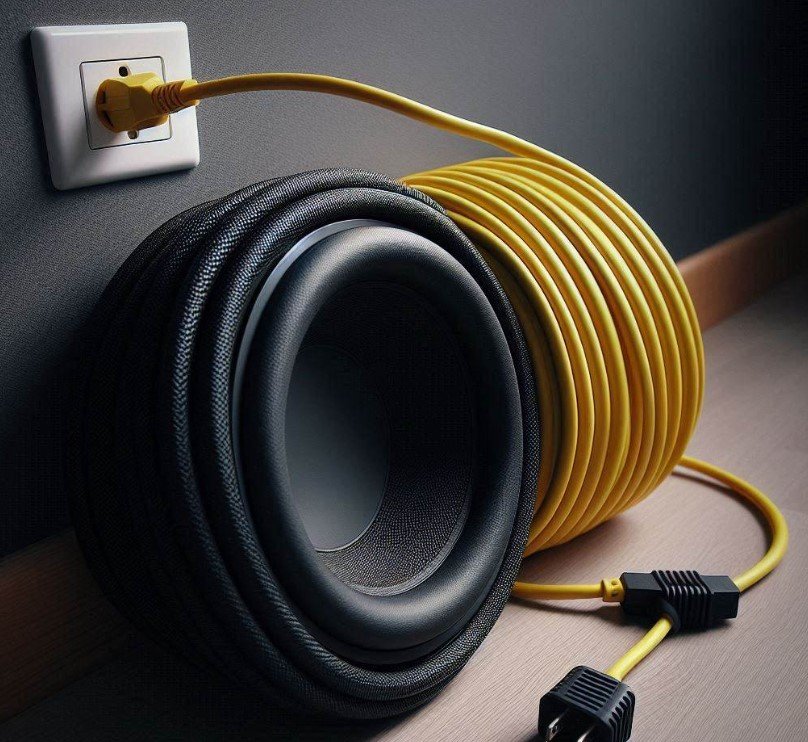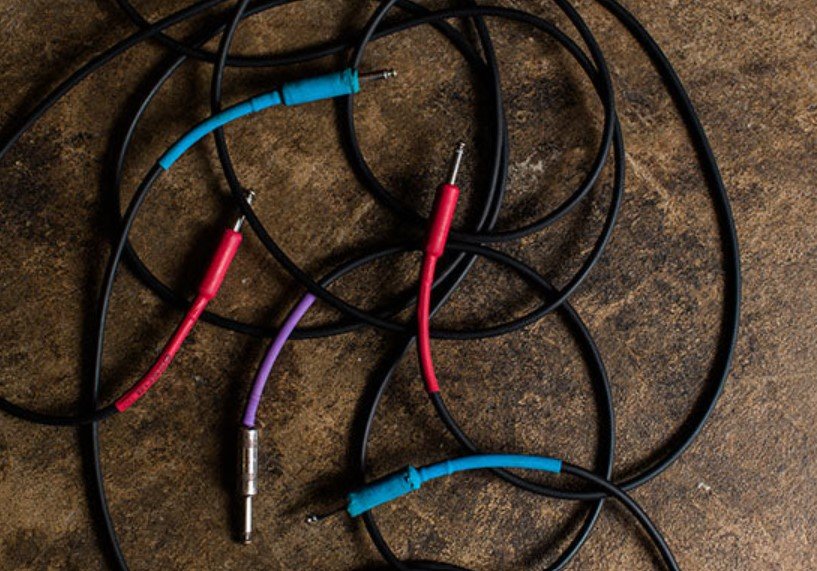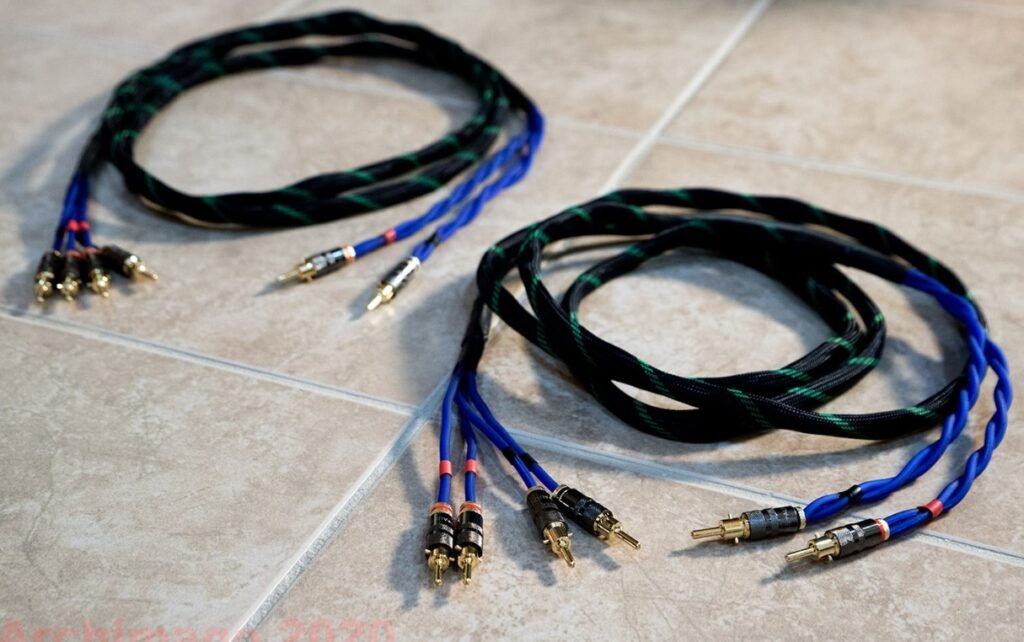This article will explain everything about whether Is it okay to have a Subwoofer Cable Next To Power Cable? Here, we’ll discuss some possible grounding problems, proper wiring techniques, and methods of obtaining the best audio performance without degradation of sound quality. Many home users creating an audio system at home become concerned with the issue of how to carry out cable management, especially in the case of subwoofer cables and power cables. Cable routing is another important aspect canceling extra noise and maintaining your audio system pure. Let’s explain whether running these cables side by side is a good idea.
Subwoofer Cable Next To Power Cable [Is It Ok To Run?]
Never run a sub close to electrical wiring at the power cables it’s due to EMI risks. Noise creates power cables in an audio system and distorts sounds produced by the subwoofer. If the speaker wire runs parallel to the power wire for only a short distance, noise induction will be minimal. A cable may need to cross another at a 90-degree angle to prevent artistic interference. Moreover, shielded subwoofer cables are available to protect the signals and allow clear sound reproduction.

Is It Okay To Run A Speaker Wire Next To An Electrical Wire?
It’s not okay to run Speaker Wires Next To Electrical Wires. This is not advisable because the mains power cord will cause 50/60Hz (depending on the country) audio noise on the speaker cables. In such a situation arises. Where the need to run cables closely is necessary. The Unit should be cabled using a pair of multicore enclosed in copper mesh or foil. This is another reason why using shielded speaker wires is advised, as it will also prevent interference thereby preserving the audio signal quality.
Can You Run A Speaker Wire And Electrical Wire In The Same Conduit?
So, Can I Run Electrical Cable And Sound Cable In The Same Conduit? No, please don’t do that. If you run an audio cable along with an electrical cable in the same conduit, the audio cable will pick up noise and compromise the sound output of the audio system. As a general rule. Do not run the speaker wire and coax cable on the same plane parallel to the conduit to a distance of less than 16 inches.
Does An Electrical Wire Interfere With A Speaker Wire?
Yes, Electrical Wire Interfere With A Speaker Wire may have a harmful effect. This can happen when the two cables are located next to each other, in which case the power-carrying cable could cause the speaker cable to pick up some noise or disturbance.

A speaker wire transmits a high current signal but with low audio frequencies (in Ethernet terminology), hence the E-net is not going to detect any interference. The speakers on the other hand will also not detect any interference as the E-net currents are quite low AND the E-net frequencies are greater than 100MHz.
Running Subwoofer Cable And Speaker Cable Together – Is It Ok Or Bad?
It is acceptable to run the subwoofer and speaker cables together without problems. Likewise, there should not be any problems with running the unbalanced audio (RCA to subs) Speaker Wire Next To Power Wire. These types of cables carry low-voltage signals which minimizes interference. In all honesty, signal interference or noise is, perhaps, very minimal chances when using very long cable runs on sensitive equipment.
Can Subwoofer Cables & Speaker Wire Run Together?
Yes, Subwoofer Cables & Speaker Wire Run Together, however, certain measures should be taken to reduce the level of interference experienced. There shouldn’t be any problems placing unbalanced audio (RCA to subs) alongside the loudspeaker cables. It is necessary to cross at an angle of 90 degrees. as possible to reduce the chances of interference. If they are properly shielded from other noise interference Maintaining high-quality sound for both the subwoofers and speakers can be achieved.
Do Power Cables Interfere With Audio Cables?
Yes, power cables can interfere with audio cables. When power cables run across an unbalanced cable, the energy within the power cable behaves like an electromagnet and generates crosstalk to other cables that are near and running in parallel. Due to the electric current, they transmit, electrical cables are notorious for producing electromagnetic interference. it is recommended to route Power Wire Separate From Speaker Wire whenever possible.

Is Speaker/Electrical Wire Running Parallel Ok?
So, Can Speaker Wire Be Ran Next To Power? No, it is usually discouraged to run the speaker and electrical wires parallel to each other. Also, when electrical wires are placed next to each other and run in parallel, they create electromagnetic fields which can cause noise in the speaker wires leading to a reduction in audio clarity. Impedance is reduced, leading to the conclusion that the speakers draw even more power from the amplifier hence they sound louder. For this reason, they are best kept apart or if they have to cross, it should be at a 90-degree angle.
Where Do You Run Your Power Cable?
To prevent electromagnetic interference, it is recommended to run power cables away from the audio, speaker, or any other signal cables. It is advisable to keep the power cables and these other types of cables on separate routes and preferably not less than 6 inches from each other. If they have to cross over signal or speaker wires, then they should be crossed at 90 degrees to limit interferences. For in-wall applications, it is advisable that one use separate conduits for power and audio cables.

Would Running Audio Cable Alongside Power Cable For Lights Cause Interference?
Yes, it is possible for the running of an audio cable together with the power cable for lights to cause interference. This is because the power cable creates an electromagnetic field which when close to an audio cable, particularly an unshielded one can create noise or produce a humming sound. Employing shielded audio cables can also minimize the chances of interference occurring.
Can Running RCA Cables Next To Power Cable Cause Distortion?
Yes, running RCA cables next to power cables can cause distortion. The presence of any electrical power will create a power wire and noise will tend to interfere with the RCA if its shielding is not adequate. Therefore, it is advisable to ensure that the RCA cables are not run in the same channel as the power cables to avoid distortion.

Does It Matter If You Run Speaker Wire Through The Same Holes As Electrical Wires?
Yes, it matters and, it is important. Installing speaker wires into the same holes as electrical wires can lead to interference which will alter the quality of the audio signal. The audio speakers’ wires carry a low voltage signal while the electrical wires carry a high voltage current which will disturb the signal carried by the speaker wires. As such, running speaker and electrical wires through different and distant holes is advisable to avoid any interferences.
RCA Cables Next To Power Cables – Is It Ok?
No, it’s not recommended to run RCA cables next to power cables. It can result in an electric disturbance in the RCA wires. This will be audible when you power it up. It may depend on RCA quality and may or may not be fine, but it is better to be safe than sorry and refrain from doing it during installation unless it is essential.
Subwoofer RCA Next To 120V Power
No, running a subwoofer RCA cable next to a 120Vpower cable is not recommended—close physical proximity to a power cable rated at 120V. The reason is that the electric current within the power cable produces an electromagnetic field which in most instances generates noise in the RCA signals distorting sound.

For this reason, where it is avoidable, there is no need to run a subwoofer RCA cable adjacent to a 120V power line. The use of high-quality and well-shielded RCA cables will also serve to limit any likelihood of causing interference.
Do You Run A High End Power Cord On Your Sub?
No, I don’t usually run a high-end power cord on my subwoofer because it’s not necessary for most users. While some audiophiles swear by them, believing they improve performance by delivering cleaner power and reducing noise, I’ve found that the stock power cord works just fine. I bet better subwoofer placement and room acoustics would make a much more apparent difference than an expensive power cord, though.
Is It Okay To Wire Outlets In Parallel?
Yes, it is generally okay to wire outlets in parallel. At the same time, all outlets receive the same voltage. It’s capable of pulling current independently. This allows for many devices. But without interfering with each other the circuit is not overloaded.
Can Speaker Wire Pick Up Interference?
Yes, speaker wire can pick up interference, especially when it’s near power wires or anything that emits electromagnetic fields. This could be in the form of noise hum or distortion of the signal. Don’t run Speaker Wire Run Near A Few Electrical Wires, and always use shielded speaker wires in a high interference environment, and of course everything must be properly grounded.

What Is Spacing Power And Audio Cables?
Spacing power and audio cables refers to maintaining a physical distance between the two types of wires to prevent electromagnetic interference (EMI). Power cables emit EMI (electromagnetic interference) and that can bleed into audio cables. A recommended distance is at least 6 inches. So, when they do have to cross, they should cross at 90 degrees to minimize interference and let the power signal. The audio signal performs to the best of their abilities.
Can You Run Network Cable Next To Power Cable?
Generally, it’s not recommended to run network cables next to power cables. There is so much electromagnetic interference from the power wires and crap that it can screw up the signal in the network cables and make everything run slow or even worse, erase data. And therefore, to bypass all this. Don’t run network cable alongside power cable or utilize shielded network cable to minimize the amount of interference.
Conclusion
To conclude, installing a subwoofer cable next to a power cable is not a good idea because of electromagnetic interference (EMI). That also leads to low fidelity, signal, especially when the wires run parallel to each other for hundreds of feet. No serious crosstalk would occur in short runs but as a general rule shielded cables should be used and if the cable has to cross, they should do so at 90-degree angles. Cable management, spacing, and good materials are all important factors in preserving the integrity of your sound system and allowing it to sound as good as possible. So, if you follow these tips, you can have nice, non-distorted sound without sacrificing quality.
Frequently Asked Questions
How far apart should audio and power cables be?
6 inches or more of separation between audio and power cables is best to avoid interference.
What is the minimum separation distance between power and control cables?
They say to keep low-voltage control wires at least 12 inches apart.
Can power cables touch each other?
Yes, power cords can touch if they are properly insulated and rated for the same volts.
Is the speaker cable ok for 12V?
Yes, speaker cables can handle 12V, as long as it’s the right device for the current.
How close is too close to power lines?
Always maintain a minimum distance of 10 feet from low-voltage power lines, depending on the voltage.
